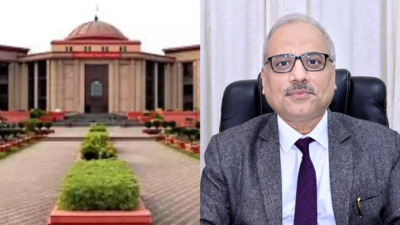- News
- City News
- raipur News
- Chhattisgarh HC gears up for National Lok Adalat: Focus on women, seniors, and long-pending cases
Trending
Chhattisgarh HC gears up for National Lok Adalat: Focus on women, seniors, and long-pending cases
Chhattisgarh High Court Chief Justice Ramesh Sinha has urged judicial officers to prioritize the resolution of long-pending civil and criminal cases, especially those involving women and senior citizens, ahead of the National Lok Adalat on March 8, 2025. Discussions focused on effective pre-litigation settlements and coordination with stakeholders.
RAIPUR: Chhattisgarh high court chief justice Ramesh Sinha directed all judicial officers to prioritise the identification and resolution of long-pending civil and criminal compoundable cases, with a special focus on cases involving women, senior citizens, matters under the Negotiable Instruments Act, and Motor Accident Claims. This directive comes ahead of the National Lok Adalat, scheduled for Saturday, March 8, 2025.
As of March 3, districts across Chhattisgarh identified a total of 1,212,685 cases, including 1,145,874 pre-litigation cases and 66,811 pending court cases, where compromise efforts are underway between the parties.
To review preparations for the National Lok Adalat, chief justice Ramesh Sinha, in his capacity as Patron-in-Chief of the Chhattisgarh State Legal Services Authority (CGSLSA), conducted a virtual meeting with all Principal District Judges/Chairpersons, Secretaries of District Legal Services Authorities (DLSAs), Family Court Judges, Permanent Lok Adalat Chairpersons, Chief Judicial Magistrates, and Labour Court Judges.
The virtual meeting was co-chaired by Justice Sanjay K. Agrawal, Executive Chairman of CGSLSA, and Justice Naresh Kumar Chandravanshi, Chairman of the high court Legal Services Committee.
During the meeting, the chief justice instructed officers to ensure pre-sittings with litigants and to identify a higher number of cases, particularly those related to Negotiable Instruments and Motor Accident Claims.
He stressed the importance of persuading stakeholders, such as insurance and finance companies, to maximise coordination and dispute settlement.
In line with the National Legal Services Authority (NALSA), New Delhi's 2025 calendar, the National Lok Adalat will be held on March 8, 2025, across all courts, including the high court, District Courts, Tehsil Courts, Family Courts, forums, tribunals, and Revenue Courts.
Civil and criminal compoundable cases, along with other matters, will be taken up for resolution. Additionally, disputes related to Public Utility Services will be addressed through Mohalla Lok Adalats.
Stay updated with breaking news, weather updates, bank holidays and upcoming public holidays in march.
End of Article
FOLLOW US ON SOCIAL MEDIA








